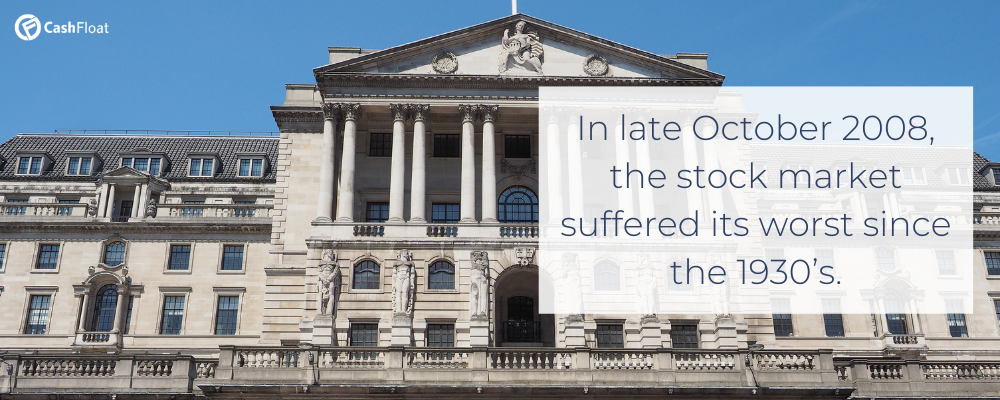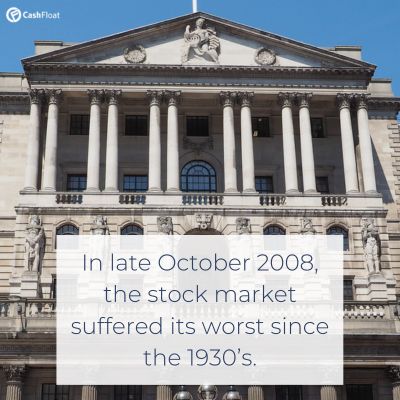The Bank of England is still considered the safest place to put your money by savers and investors alike. Cashfloat explores the banking deregulation in the UK and how this was affected by the Financial Crisis of 2008.

During the 1980’s and 1990’s there was an explosive change of banking deregulation, and the deregulation of financial markets led to the globalisation of capital markets. The ordinary high street banks were suddenly becoming involved in investment banking as well as retail banking. Accounts that tracked the stock market were now available to ordinary customers. The Big Four banks bought out small building societies which led to less competition for mortgages and other profit making sources.
At the same time, the introduction of computers to keep records was also taking place, making banking faster and more efficient. The big banks began issuing their own credit cards as well as debit cards, and were more focused on selling services like insurance, pensions, long and short term loans and credit cards. Customers were also invited to sign up for long term accounts that would pay out substantial sums of interest at the end of the term. During a period of bullish investments this worked very well for a time. In addition, because banking was subject to less regulations you could switch your account from one bank to another quite easily.
Banking Deregulation – The PPI Scandal
Of course, as banks were eagerly vying for trade, many of these institutions offered deals that seemed too good to be true. Additionally many banks were offering PPI. This is payment protection insurance which should cover loan payments in the event of illness, disability or death. Unfortunately this insurance was being issued to people who were not subject to the criteria specified by the insurance company. And, many people were subject to mis-selling as they did not understand what they were signing up for. Some customers were told that this was a condition of getting the loan.

The Beginning of Online Banking
By the year 2000, many customers were operating their accounts using online banking via the Internet. This meant that they could apply for an online loan as well as credit cards or many other services. And, all without having to meet a bank manager or account manager. Banking was making large profits but without paying the strict attention necessary to compliance and this led to some banks over extending by entering the sub prime mortgage market. Sub prime mortgages were issued to people who had a dodgy credit record. In return for the loan or mortgage, the customer paid a higher rate of interest than that offered to customers who were deemed to be a better credit risk. There were huge profits to be made in this kind of market but the risk proved to be too high for some banks.
The Financial Crisis of 2008
The late 2000’s saw the failure of a number of large banks including Bear Stearns and Lehman’s. This led to the equivalent of a banking earthquake as one after another large banking institutions came close to collapse. In the USA, Merrill Lynch and AIG were threatened and in the UK the stolid Bradford and Bingley Building Society, HBOS and the Royal Bank of Scotland all came close to failing and had to be rescued by the government.
The rise in personal debt and unsustainable lending had led to the financial world almost suffering a total collapse. When Lehman’s bank in the USA failed it led to a chain reaction across the financial markets and in the UK the government relaxed the rules on the competition laws so that Lloyd’s bank could take over HBOS. In late October, investors started to bail out and the stock market suffered its worst losses since the 1930’s. The term ‘too big to fail’ became a byword for banks that had to be saved by taxpayers money and the fall out from this was the mistrust of bankers that still holds some sway today. Many ordinary people began to wonder why bankers were paid such large bonuses when they had been at best foolish and at worst downright incompetent. The orderly market of banking was destroyed to such an extent that it has still not fully recovered.
Following the crisis there was a parliamentary commission set up to look into what went wrong in the banking sector. This resulted in a series of measures that would ensure that retail operations were ring fenced away from riskier investment banking services. Bankers had bonuses capped so that they would not be seen to be rewarded for failure and a levy was imposed to raise money that would help to sustain the economic recovery of the country. The government also wanted to discourage banks from risky lending but this had the knock on effect of stifling the economic growth in the UK.


An End to Banking Deregulation: New Compliance Rules
Banks are now charged with rigid compliance regulations and rules that are meant to ensure that the big crisis of 2008 never happens again. There has been a Financial Services Act introduced with the Bank of England keeping an eye on the credit markets and also supervising banks so that consumers are protected. There are three new bodies that now oversee banking in the UK. The Financial Policy Committee looks after regulations, the Prudential Regulation Authority rules over individual financial companies and the Financial Conduct Authority is there to protect consumers from dangerous practices and ensures that all financial workers keep to the rules of compliance issues.
The level of protection via the Financial Services Compensation Scheme for bank deposits has increased and it now stands at £31,700 per person. In addition, the FSA looks closely at the appointment of bank board members and the chief executives of individual banks. In the past there was insufficient vetting for chief executives who came from all walks of life and different work backgrounds. Before the crisis it was thought that banking was a commodity and could be sold like any other retail item. However, it appears that it is now firmly understood that suitable candidates should have a sound financial background before being appointed as a chief banking executive.
Banking Then and Now
Banking has come a long way since the first cash was deposited in temples by merchants who wanted their money safely guarded. The banking system in London is still the centre of the financial world. Likewise, the Bank of England is still considered to be the safest place to put your money by savers and investors alike. Prior to the twentieth century banking was considered to be for the wealthy and for aristocrats. Now everyone has access to good banking facilities. The numerous safeguards put in place makes a UK bank an excellent place to stash your well earned money. Read more about the history of online loans and credit on our blog.


